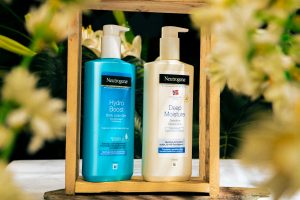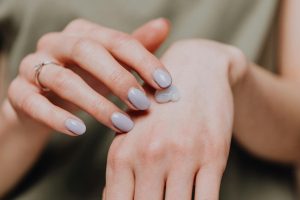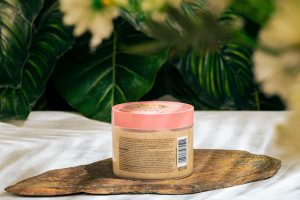Moisturizer
A moisturizer is a cosmetic product employed for lubricating, protecting, and moisturizing the skin. Such actions are typically carried out by sebum secreted by healthy skin. The term moisturizer comes from the Latin verb mollie to soften.
In the human body water continuously evaporates from the inner layers of the skin by an action called transepidermal water loss. Human skin naturally keeps itself dry and easily shed as a protective barrier to pathogens, dirt, or damage, and keeps itself from drying out and getting brittle and stiff by controlling its content of water
. The presence of the lipid bilayer between dead skin cells determines how much moisture can be retained.
Moisturizers alter the rate of water loss with active ingredients of moisturizers belonging to one of two groups occlusives and humectants.

Types of moisturizer
There are numerous varieties of moisturizers. Petrolatum is an excellent moisturizer although it happens to be non-popular due to being too oily. It includes a range of commonly used moisturizers that include cetyl alcohol Cetearyl alcohol, cocoa butter, isopropyl myristate, isopropyl palmitate, lanolin, liquid paraffin, polyethylene glycols, shea butter, silicone oils, stearic acid, stearyl alcohol, and castor oil, among others.
Lotions
They are poorer than creams and are in combination with normal skin types. They provide an equilibrium of hydration and are ideal for daily use.
Ointment-Based Moisturizers
Ointment moisturizers are the thickest and most occlusive form of moisturizer. They seal in moisture and prevent the skin from drying out all day. These are best used for very dry or eczema skin and work best in very dry or cold weather. Moisturizers can also exist in the form of lotions, creams, ointments, bath oils, or soap substitutes. Mineral oils and waxes do not undergo oxidation or rancidity. Consequently, they have, in effect, displaced vegetable oils with emollients and topical medication.
Cosmetics of moisturizers can further consist of antioxidants, ceramides, emulsifiers, fragrances, penetration enhancers, preservatives, and solvents. Certain commodities come in anti-wrinkle and skin-enhancement forms. Several plant and animal extracts have been purported to convey skin benefits, but these are brought forward without much scientific support.
Moisturize for health risks
Over-moisturization
Chronic moisturization of the skin through contact with water can cause an allergic response or contact dermatitis. It may permit penetration of foreign substances through the skin.
Alterations of the skin’s normal ecologic environment either on top or in the skin can also permit overgrowth of disease-causing pathogens.
Allergens
Food additive odors in moisturizers can cause an immune response, such as the formation of an allergy. There is no regulation yet on the use of the term hypoallergenic. Some hypoallergenic pediatric skin products have allergens.
Individuals with eczema are particularly susceptible to allergic responses to lotions and creams since their impaired skin barrier permits preservatives to bind to and stimulate immune cells. The American Academy of Allergy, Asthma, and Immunology issued a warning in 2014 that natural lotion with ingredients that are commonly used in foods like goat milk, cow’s milk, coconut milk, or oil can trigger new allergies, which may lead to an allergic reaction upon subsequent consumption of such foods.

Importance of moisturizer
Hydrate your skin
Dryness caused by dehydration tightens the skin. It causes itching, dullness, and roughness of the skin. A moisturizer replenishes deep hydration, cares for your skin, and gives back the lost moisture. Usage daily maintains a level of moisture consistent in your skin, making it nourished which is necessary for the health & glow of your skin. It also inhibits dryness and flakiness from setting in and lessens the loss of suppleness and elasticity of the skin.
Barrier protection
They keep the moisture in your skin and prevent trans-epidermal water loss. In addition, It provides a soothing protective film and reinforces the skin’s natural barrier against issues like hyperpigmentation, acne, redness, and sensitivity.
Signs of aging
Dry skin can weaken its skin barrier and defense, causing irritation and premature aging. Delaying the appearance of aging and fine lines and wrinkles is one of the primary benefits of moisturizer on the face. Moisturized skin is more voluminous and youthful, making moisturizers essential in your daily care routine.
Gets a smooth texture
Moisturizers cover minute fissures of the skin and smooth out the skin texture. It also safeguards the skin from rubbing, hence suits rough or irregular skin.
Soothes irritation & sensitive skin Moisturizers with soothing ingredients such as aloe vera, chamomile, oat extract, and allantoin may soothe irritated or sensitive skin. It soothes dry and inflamed skin as well and ensures it remains healthy.
Fights acne
Despite what many believe oily skin also requires moisturizing Without adequate hydration. Your skin can overproduce sebum, resulting in clogged pores and acne.
Applications of moisturizers
Moisturizers are applied in the management of some skin conditions, including psoriasis, ichthyosis vulgaris, xerosis, and pruritus of atopic dermatitis. Moisturizers are applied in disposable nappies to prevent dry skin and nappy dermatitis.

Moisturizers have some positive effects in the treatment of atopic dermatitis eczema. The application of moisturizers improves the comfort of the skin and may minimize disease flares. They can be employed as leave-on therapy, bath additives, or soap substitutes.
There are numerous moisturizer products, but most leave-on treatments from least to most greasy are one of the following lotions, creams, gels, or ointments. Since none of the various types of moisturizers are superior to the others, individuals with atopic dermatitis must select one or more products based on their age, involved body site, season, and personal preference. But daily use of moisturizers by infants in the first year of life is not helpful to avoid the development of atopic dermatitis and may heighten the risk of skin infection.
